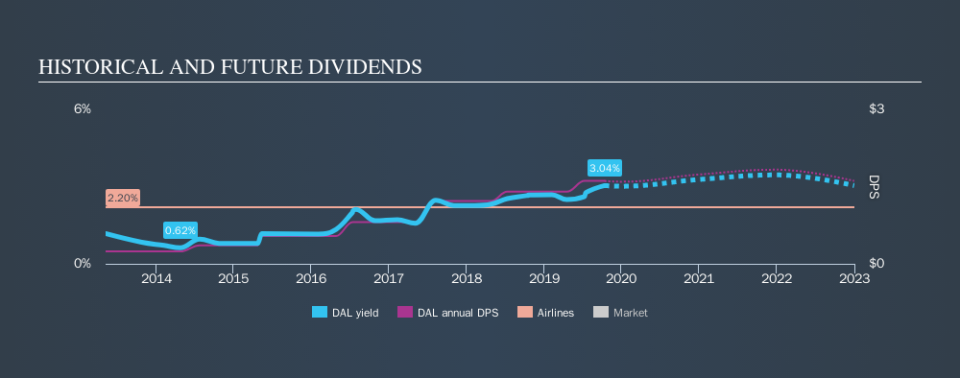Delta Air Lines, Inc. (NYSE:DAL) Is Yielding 3.0% - But Is It A Buy?

Could Delta Air Lines, Inc. (NYSE:DAL) be an attractive dividend share to own for the long haul? Investors are often drawn to strong companies with the idea of reinvesting the dividends. If you are hoping to live on the income from dividends, it's important to be a lot more stringent with your investments than the average punter.
In this case, Delta Air Lines likely looks attractive to dividend investors, given its 3.0% dividend yield and six-year payment history. It sure looks interesting on these metrics - but there's always more to the story . The company also bought back stock equivalent to around 6.2% of market capitalisation this year. Some simple research can reduce the risk of buying Delta Air Lines for its dividend - read on to learn more.
Click the interactive chart for our full dividend analysis
Payout ratios
Companies (usually) pay dividends out of their earnings. If a company is paying more than it earns, the dividend might have to be cut. Comparing dividend payments to a company's net profit after tax is a simple way of reality-checking whether a dividend is sustainable. Looking at the data, we can see that 20% of Delta Air Lines's profits were paid out as dividends in the last 12 months. We like this low payout ratio, because it implies the dividend is well covered and leaves ample opportunity for reinvestment.
We also measure dividends paid against a company's levered free cash flow, to see if enough cash was generated to cover the dividend. Delta Air Lines paid out a conservative 28% of its free cash flow as dividends last year. It's positive to see that Delta Air Lines's dividend is covered by both profits and cash flow, since this is generally a sign that the dividend is sustainable, and a lower payout ratio usually suggests a greater margin of safety before the dividend gets cut.
Consider getting our latest analysis on Delta Air Lines's financial position here.
Dividend Volatility
One of the major risks of relying on dividend income, is the potential for a company to struggle financially and cut its dividend. Not only is your income cut, but the value of your investment declines as well - nasty. Looking at the data, we can see that Delta Air Lines has been paying a dividend for the past six years. The company has been paying a stable dividend for a while now, which is great. However we'd prefer to see consistency for a few more years before giving it our full seal of approval. During the past six-year period, the first annual payment was US$0.24 in 2013, compared to US$1.61 last year. Dividends per share have grown at approximately 37% per year over this time.
Delta Air Lines has been growing its dividend quite rapidly, which is exciting. However, the short payment history makes us question whether this performance will persist across a full market cycle.
Dividend Growth Potential
While dividend payments have been relatively reliable, it would also be nice if earnings per share (EPS) were growing, as this is essential to maintaining the dividend's purchasing power over the long term. Delta Air Lines's EPS have fallen by approximately 11% per year. A sharp decline in earnings per share is not great from from a dividend perspective, as even conservative payout ratios can come under pressure if earnings fall far enough.
Conclusion
To summarise, shareholders should always check that Delta Air Lines's dividends are affordable, that its dividend payments are relatively stable, and that it has decent prospects for growing its earnings and dividend. Firstly, we like that Delta Air Lines has low and conservative payout ratios. Earnings per share have been falling, and the company has a relatively short dividend history - shorter than we like, anyway. While we're not hugely bearish on it, overall we think there are potentially better dividend stocks than Delta Air Lines out there.
Given that earnings are not growing, the dividend does not look nearly so attractive. Businesses can change though, and we think it would make sense to see what analysts are forecasting for the company.
Looking for more high-yielding dividend ideas? Try our curated list of dividend stocks with a yield above 3%.
We aim to bring you long-term focused research analysis driven by fundamental data. Note that our analysis may not factor in the latest price-sensitive company announcements or qualitative material.
If you spot an error that warrants correction, please contact the editor at editorial-team@simplywallst.com. This article by Simply Wall St is general in nature. It does not constitute a recommendation to buy or sell any stock, and does not take account of your objectives, or your financial situation. Simply Wall St has no position in the stocks mentioned. Thank you for reading.

 Yahoo Finance
Yahoo Finance 
